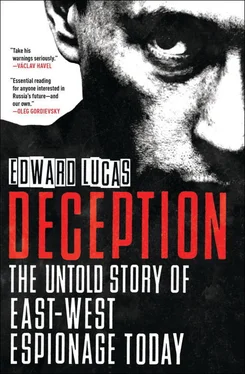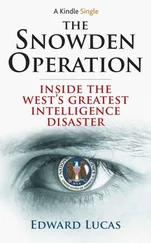The risks sharpen the focus. Officialdom often wastes public money. Errors in espionage mean not just unwanted buildings or ill-conceived regulations but deep damage and ruined lives. Treason bears heavy criminal penalties. In most operations, therefore, the human costs of failure outweigh the benefits of success. The resulting caution is in constant tension with the central means of espionage – rule breaking – yet it is vital that it does not overwhelm it. An intelligence officer who flinches at this might as well be a diplomat.
Imagine, for example, that you are a spymaster considering a potential source – someone, perhaps, like Sergei Skripal, a Russian intelligence officer who for many years passed his country’s secrets to Britain. If your service successfully recruits and runs him, your country gains invaluable information about Russia’s military capabilities and intentions, about its decision-making processes, about the weaknesses and strengths of its security procedures, about its intelligence-gathering efforts abroad, and much more besides. Your country is better informed and safer. Your taxpayers have got value for money. Your political masters will be pleased. Your career will flourish. But your source, if caught, is likely to end his days in a hard labour regime camp somewhere near the Arctic Circle (Mr Skripal was sentenced to thirteen years in 2006; he was one of the four prisoners that Russia swapped for Ms Chapman and her colleagues). 4
The danger can be even greater. If your operation in China, Iran or Syria is blown, your source faces not just prison, but death, perhaps by torture. For their induction into the Soviet GRU military intelligence service, recruits were shown a film of the fate awaiting those who betrayed its secrets (the account comes from a defector who was undeterred). It showed a man, gagged and wired to a steel stretcher, being trundled to the door of a furnace prior to being burned alive:
He strains to the point of breaking his own bones, and tearing his own tendons and muscles. It is a superhuman effort. But the wire does not give. And the stretcher slides smoothly along the rails. The furnace doors move aside again and the fire casts a white light on the soles of the man’s dirty patent leather shoes. He tries to bend his knees in an effort to increase the distance between his feet and the roaring fire. But he can’t. 5
To save a source from such a fate means a lot of dull errands. Go to the Hotel Sheraton in Kiev and leave this envelope at reception to be collected by Mr Brown. Go to the DHL office in Riga and pay cash for the delivery of this envelope to a Mr Smith in Dublin. Go to a bank in Helsinki, leave one package in a safe-deposit box and collect another. Buy a coffee and read a newspaper in the glass-walled metro station at Moscow’s Sparrow Hills between eleven and twelve every Saturday, wearing a red scarf. That is a signal to Mr Skripal (en route to his regular sports club) that everything is all right. If he is wearing a hat, he’s OK too.
The precautions are necessary because of the time-consuming yet vital assumption that the other side may be watching. Most messages can be exchanged via brush contacts or dead-letter boxes. A memory card the size of a fingernail can carry gigabytes of data, though any non-specialist examining it will find only some anodyne tourist snaps. Mr Skripal can wrap it in chewing gum and stick it to a park bench, or to the side of his seat during his regular Sunday night cinema trip – having first made sure he is sitting next to a woman with a white shirt and red scarf. Meetings are rare and preferably in third countries. Spycatchers suspicious of Mr Skripal see only normal life in Moscow, and harmless recreation elsewhere: an overnight trip to a football match in, say, Kiev. Even detailed scrutiny of the CCTV recordings in his hotel there will not reveal the meeting that took place in its penthouse suite, with a case officer who rented it in the guise of a foreign businessman.
Another Russian source might take his holidays in Vienna, and have a long-standing interest in the Central Cemetery. Its 250 hectares [27] aa 650 acres.
feature interesting graves from Freud to Mozart. It has another advantage from an espionage point of view: the long paths and clear sightlines give plenty of opportunity to see if anyone is watching. Assuming all is clear, he can be picked up by a scruffy van parked in some remote corner of the grounds. Inside are comfortable chairs, a bottle of vodka, and a case officer eager to debrief him. Half an hour later, he is wandering round the cemetery again. Spycatchers’ resources are finite: if scrutiny reveals nothing, then they turn to something more promising.
Such elaborate precautions are costly and make sense only for the most highly placed source. Yet if anything goes wrong, he ends up rotting in a labour camp. Every stage needs to be hammered out in advance. Can that hotel penthouse in Kiev be dependably booked in advance? Can the source plausibly stay there on his official salary? Where exactly are the CCTV blind spots? Who will make the reservation? How will the bill be paid? Will the credit card be traceable? What passport will be used? Who will sweep the room for bugs? Each new precaution creates a new difficulty and something else to go wrong. The ideal operation has as few moving parts as possible. It is better to rely on split-second timing, which practice and professionalism can perfect, than on elaborate schemes that are vulnerable to the unexpected.
Take the Vienna trip: what happens if it is pouring with rain? A dedicated grave-spotter may take a short damp walk to see a famous tomb, but not a long one. So what is the back-up plan? A nearby church? Is it always open? What if a service is happening? And how to communicate if the plans go awry? Sussing that out requires lots of legwork. The officers working on this team will know Vienna’s tourist attractions backwards by the time they have finished. Organising brush contacts, dead-letter boxes and signals in Moscow is even more difficult, and involves a stream of innocent-seeming bag men (and bag ladies), scarf-wearers and scouts who will turn up and run errands, dependably, punctually, and inconspicuously, right under the noses of the Russian FSB. Compounding the cost of all this is the need to avoid any recognisable pattern of behaviour. Too many visits to Vienna, or to Kiev, arouse attention. A dead-letter box is most secure when it is used sparingly, ideally only once. So the attrition rate is high. No sooner has an impressively guileful idea been worked out than it starts wearing out.
Such difficulties and precautions beset every stage of agent-running: identifying a potential source, softening him up (‘cultivation’ in spy-speak), presenting bluntly the offer of cooperation (‘pitching’); keeping him safe, motivated and productive (‘agent-running’), debriefing him (‘elicitation’) and when he is no more use standing him down (‘terminating him’). A promising source may be a ‘dangle’ – someone presented by the other side in the hope of flushing out some clues about the way you work. If a source is willing to betray his own country, his loyalty to the person who brokers the betrayal must also be questionable. Even if he starts off genuine, suppose he comes under pressure from the other side, and betrays you and your methods? Maybe he will prove a time-waster, just in search of easy money for old news? The adversary’s ‘wish-list’ is one of the most sought-after pieces of intelligence in the whole spy world. If you know what the other side does not know, you are in a good position to mislead them and to conceal your real secrets.
At a more trivial level, methods and tradecraft are vulnerable too. If a double agent reveals dead-letter boxes, his side can put them under observation in case another, unknown, agent is using them too. Who empties them? Maybe an embassy-based archivist or visa clerk not previously under suspicion as an intelligence officer. Then you have a new target. Giving a clever communications gadget to a newly recruited source can backfire. If he is caught or switches sides, anyone else using a similar device is at greater risk. A ‘walk-in’ who turns up at an embassy in a sensitive country demanding to speak to an intelligence officer can hardly be ignored. But even the initial vetting of such an approach is risky. Whoever meets the visitor may be being set up for embarrassment or expulsion. For someone based at an embassy in Moscow, this will mean a career-blighting departure to London, perhaps after first being humiliated in surreptitiously filmed clips broadcast on the evening television news. 6
Читать дальше












